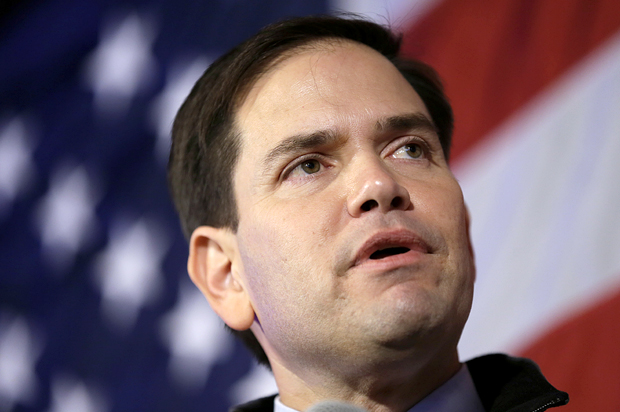Marco Rubio’s presidential campaign remains a deeply flawed contraption of hype elevated over substantial experience and achievement. Given that, there are two ways to read this National Review story about Iowa Republicans’ frustration with his anemic ground game in their state.
On one hand, it is yet another example of how Rubio, despite poll numbers touted as shiny, is running a pretty lousy overall campaign. For months, stories have percolated about its cheapness, which Rubio’s advisers have bragged about. Lay out the cash to rent campaign offices? Pfffft. Who needs an office when the team can do everything from their laptops in Starbucks, nursing $4 lattes for several hours while poaching the free Wi-Fi? It’s edgy and hip, to people who still think of Starbucks as hip.
Rubio’s team instead has spent their money, as NR points out, more on TV ads and “digital outreach.” The theory seems to be that in this interconnected modern world where you can take Harvard classes or get your melanoma diagnosed online, the candidate can be less engaged in old-fashioned retail politics while selling himself on a national level to Republican voters across the country. Which might not be a bad strategy, if voting for all the primaries happened on the same day. But in places like Iowa and New Hampshire, voters still value the candidate who makes the effort to come to their state and schmooze for their vote.
In fact, the modest-at-best success of this strategy so far highlights just how much of Rubio’s status as one of the top contenders for the GOP nomination is an artificial creation of the Republican establishment and the mainstream media. For a Republican Party that needs more young voters, the Florida senator must seem like a godsend. He’s the perfect synthesis of youthful energy and revanchist policies, a dudebro who can exhort his love of football to people under 30, reeling them in before explaining why abortion should be outlawed with no exceptions and the United States should reinstate the embargo against Cuba.
On the other hand, the complaints of people in Iowa and New Hampshire that a candidate is failing to pay proper fealty to them in exchange for their votes highlights the absurdity of the primary process in this modern, multi-cultural America. The two states are among the smallest in population, with a total population of just under 4.5 million. They are also two of the least diverse states, both ethnically and economically. Yet any campaign that doesn’t at least make a strong showing in one or both states’ primaries gets tagged as “struggling,” saddled with bad press and a campaign death watch, and sends donors fleeing to candidates who made stronger showings.
But anyone who questions the states’ place in line gets shouted down and disappeared faster than a communist apparatchik mildly criticizing a five-year plan. Republican strategist Liz Mair got a hard lesson in this dynamic last March. Hired by Wisconsin governor Scott Walker to work on his now-defunct campaign, Mair was forced to resign after one day when someone uncovered tweets she had posted mocking Iowa’s place at the forefront of the primary process.
Or recall the firestorm that erupted before the 2008 primaries, when Michigan and Florida tried to jump the line and move their own primaries forward. This resulted in lots of shouting, finger-pointing, complaints about a lack of respect for tradition, and Iowa almost moving its caucuses into 2007 so it could still be the state where the primary voting started. The Democratic National Committee came very close to stripping Michigan and Florida of their delegates as punishment. In 2012, the Republican National Committee did strip Florida of its delegates when the state once again tried to flout the rules to move its primary forward.
Rubio’s strategy might be easier to understand if there was some indication that the campaign is hoarding resources for later. But that does not appear to be the case, and it might cost him down the road, when he will need more than hype from the establishment and the press to keep his campaign aloft. On the flip side, he’s highlighting an absurdity of the primaries and pissing off a bunch of self-important Republicans in the process. For liberals, it’s a win-win.


